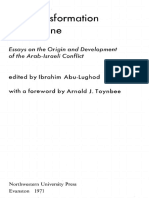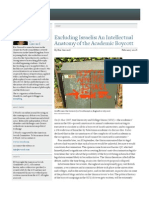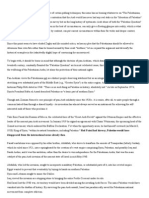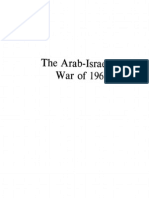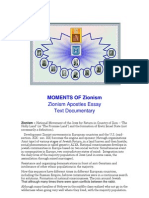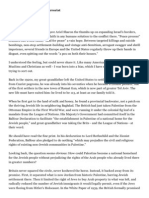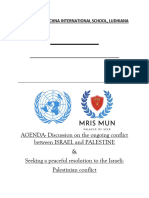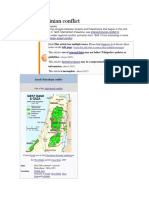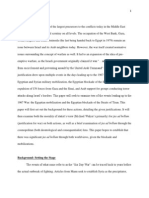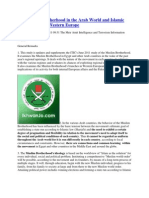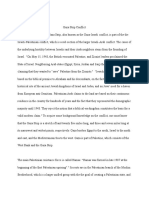Hamas: A Beginner's Guide: Khaled Hroub London and Ann Arbor, MI: Pluto Press, 2006
Uploaded by
Salim UllahHamas: A Beginner's Guide: Khaled Hroub London and Ann Arbor, MI: Pluto Press, 2006
Uploaded by
Salim UllahHaaretz (English edition)
January 5, 2007
Hamas through Rose-colored Glasses
Hamas: A Beginner's Guide
Khaled Hroub
London and Ann Arbor, MI: Pluto Press, 2006.
Khalid Hroub's book has a number of purposes, some declared, others implied. It
"sets forth to tell the story of the 'real' Hamas'in all its aspectsnot the
misperceived and distorted one" so prevalent in the West, which is said to view
Hamas solely through the lens of terrorism. Providing the "basic information and
necessary clarifying analysis," says Hroub, the director of the Arab Media Project at
Cambridge University and host of a weekly book review programme for al-Jazeera
TV, will enable the reader to shape her or his own opinion about the movement. It is
not his intention, Hroub declares, to provide an "apologetic treatise" for Hamas.
Indeed, he prefers the organization's nationalist agenda to its religious one, and
occasionally express concerns over Hamas's desire to Islamize Palestinian society.
But the book's overall tone is clearly sympathetic. Hamas is presented as a deeply
rooted force in Palestinian society waging a just struggle against a powerful
imperialist-colonialist enemy Israel - even if its means are at times objectionable or
counter-productive. Whatever "radicalism" Hamas exhibits, he says, is a "completely
predictable result of the ongoing Israeli colonial project in Palestine." At the same
time, Hroub argues that Hamas has evolved over time, demonstrating a pragmatism
which "hovers around accepting the concept of a two-state solution." By emphasizing
Hamas's pragmatic side, Hroub is sending a message to Western public opinion and
governments that Hamas is worthy of additional support and sympathy, and should be
engaged lest it become "radicalized and militarized." And finally, one can surmise
that Pluto Press, which according to its website has always promoted a "radical
political agenda" and whose authors have "a wide range of progressive political
viewpoints," aspires to help build a common front between secular "progressives" and
a religious-based mass movement against the oppressive forces of Western
imperialism. Doing so, the publishers and author apparently believe, would
undermine the "clash of civilizations" theory which supposedly drives Western policy
in the Middle East, and re-orient Western governments and societies away from
support for Israel. It would also help resolve the so-called progressives' conundrum of
why religion has proved to be a greater mobilizing force among the downtrodden of
the Middle East than class solidarity or a common Third World, "anti-imperialist"
agenda.
Knowing these purposes is essential if beginners, for whom the book is explicitly
designed, are to make an informed judgment regarding Hamas. But this alone is not
enough. Although the book does contain much useful information and provides food
for thought, its pretensions to objectivity and facts are too often exposed as hollow,
and its list of recommended reading highly skewed. One can't help but think that Fox
TV News's unintentionally ironic slogan, "we report, you decide," applies to this
book as well Thus a reader, even one sympathetic to a "progressive", pro-Third
World, anti-American position, should be aware that the lens is frequently distorted,
either by commission or omission.
Those aware of some of the basic contours of the history of the region and of the
Arab-Israeli conflict will immediately note that Hroub unabashedly presents the
Palestinian narrative of events in a way which plays fast and loose with facts and
context. Palestinians have "peaceably occupied" their lands for over 2000 years;
Jerusalem was the Palestinians' "capital city" before 1948; in 1967, "Israel launched
another successful war" (without any reference to the Arab war coalition which had
formed on its borders); the first intifada in December 1987 was sparked by an Israeli
truck driver who responded to the killing of an Israeli settler by deliberately running
over and killing four Palestinians (presenting rumor as fact); all of Hamas's suicide
bombings have been "directly linked to specific Israeli atrocities against Palestinian
civilians" (taking Hamas statements at face value); the Dome of the Rock was built
adjacent to "where the Jews say the Old Temple of Solomon was built," language
which calls into question the Jewish people's historical connection to Jerusalem.
Inexplicably, Hroub states that the final status talks stipulated by the Oslo Accords
never took place, ignoring entirely the Clinton-orchestrated negotiations in July 2000
and the follow-up intermittent high-level talks over subsequent months.
Hroub's treatment of Hamas's founding 1988 Charter also raises questions. While
acknowledging its numerous anti-Jewish statements (including the Charter's
approving referral to the Protocols of the Elders of Zion), he dismisses them as
irrelevant to contemporary realities and describes the Charter itself, with its
"embarrassing" rhetoric as "largely obsolete." Hamas's governing platform, issued
after its surprise 2006 election victory, he says, is so far away from the Charter in its
concrete treatment of the issues facing the Palestinians that one can even speak of a
"new Hamas". But what about Hamas's numerous statements and publications in
recent years which convey the same message as the Charter, including Holocaust
denial?
Hroub poses the question: "Is Hamas planning the destruction of Israel?" His answer
is that Hamas's "ultimate slogan," 'the liberation of Palestine', "falls short of saying
what would actually be done with Israel should that goal be achieved." Such verbal
acrobatics strain his credibility. But in any case, he insists, the argument that Hamas
desires Israel's destruction is irrelevant and unrealistic: no Palestinian or other Arab
party or state dreams of having the ability to destroy Israel; "it is an uncontested fact
that there is no threat to the existence of Israel in either the medium or long term," and
saying otherwise "is a matter of political propaganda and emotional sensationalism."
One wonders if the numerous explicit statements advocating Israel's destruction by
senior Hamas leaders, from Khalid Mash`al on down, which he conveniently ignores,
also fall in the realm of propaganda and emotional sensationalism.
If Hroub is referring only to possible military capabilities, then there may be a point to
his argument, even as he ignores the threat of nuclear terrorism. But his categorical
statements mesh seamlessly with the larger themes he is trying to promote, of a
Hamas which is evolving in the direction of pragmatism, realism and statesmanship.
But why, one must ask, should Hamas's increasing sophistication and focus on
immediate issues be seen as pulling it away from its long term goals, instead of
serving them? Does the fact that the movement has evolved both in discourse and
tactics mean that it has abandoned its ideals? In fact, Hamas spokesmen have long
claimed that time is working in the Palestinians' favor, and that Israel will disappear
within the next few decades. It is within this context that one should understand the
Palestinian interest in a hudna (ceasefire) over a defined period, to be renewed only if
Israel were to accede to Palestinian demands. Establishing a hudna would require an
Israeli withdrawal from the entire West Bank, Gaza and East Jerusalem and the
establishment of a Palestinian state there, while not compromising Palestinian rights,
i.e. the "right of return" of refugees and their descendants, numbering, he says, "more
than six million". Since the book appeared, even more explicit statements have been
made by Hamas officials proclaiming acceptance, and even implementation of the
"right of return" as a condition for accepting the hudna. Given the fact that the
refugee issue is, as Hroub rightly says, "the most intractable one" in the Palestinian-
Israeli conflict, one is hard-pressed to see the hudna, in the Hamas world-view, as
being anything but a stage in realizing the movement's ultimate goal of establishing an
Islamic state in all of historic Palestine.
Indeed, one may conclude from the book that Hamas has gone from strength to
strength, and thus has the confidence and staying power to reconcile short and long
term goals. Hamas appears here as a multi-pronged organism which has succeeded in
anchoring itself in Palestinian society, through a combination of "resistance," political
action, social and charitable work underpinned by religious principles, and avoidance
of corruption. Viewed in this light, Hamas's sweeping electoral success a year ago
was a natural outcome, even though Hamas's and affiliated independents' share of the
popular vote (45%) was considerably less than the figure Hroub cites (almost 60%).
Moreover, in spite of the steadily worsening situation in the territories since Hamas's
assumption of leadership over the Palestinian Authority, Hamas has maintained and
even enhanced its popularity, as the Palestinian public has blamed other parties,
foreign and domestic, for its difficulties. Can Hamas maintain its newly achieved role
as the leading force in Palestinian affairs? Can it successfully manage the inevitable
differences between its internal and external factions, and its military and civilian
wings? Can it break the international boycott and siege which has played havoc with
Palestinian finances and living standards? And can it avoid fatally compromising its
underlying principles that reject any historic compromise which would entail
legitimizing the State of Israel? Israeli policy makers, and Israeli society, should
assume that the answer to these questions will be affirmative. Armed with such
sobering knowledge, Israel should seek creative and prudent ways to protect its vital
interests and manage the bedeviling and protracted conflict with its Palestinian
neighbors and adversaries.
Bruce Maddy-Weitzman
Senior Research Fellow
The Moshe Dayan Center for Middle Eastern and African Studies, Tel Aviv
University.
Author of Palestinian and Israeli Intellectuals in the Shadow of Oslo and Intifadat
al-Aqsa, published by the Tami Steinmetz Center for Peace Research, Tel Aviv
University, 2002, and by the Dayan Center, in Hebrew, in 2003.
You might also like
- The Transformation of Palestine Essays On The Origin and Development of The Arab-Israeli Conflict by Ibrahim Abu-Lughod100% (2)The Transformation of Palestine Essays On The Origin and Development of The Arab-Israeli Conflict by Ibrahim Abu-Lughod538 pages
- Mythologies Without End 9780190459109 2020017143 9780190459086 9780190074609No ratings yetMythologies Without End 9780190459109 2020017143 9780190459086 9780190074609557 pages
- Report On BDS Forum Held at Brooklyn College On February 7, 2013100% (2)Report On BDS Forum Held at Brooklyn College On February 7, 201337 pages
- The Roots of Nationalism in The Muslim WorldNo ratings yetThe Roots of Nationalism in The Muslim World25 pages
- Full Text of - Chamish - Shabtai Tzvi, Labor Zionism and The Holocaust - PDFNo ratings yetFull Text of - Chamish - Shabtai Tzvi, Labor Zionism and The Holocaust - PDF99 pages
- Walking The Red Line: Israelis in Search of Justice For PalestineNo ratings yetWalking The Red Line: Israelis in Search of Justice For Palestine10 pages
- Excluding Israelis: An Intellectual Anatomy of The Academic BoycottNo ratings yetExcluding Israelis: An Intellectual Anatomy of The Academic Boycott8 pages
- Chaim Weizmann - Statesman Without A StateNo ratings yetChaim Weizmann - Statesman Without A State19 pages
- Middle East 101 Building Knowledge, Busting Myths (Everything You May Not Know About The Middle East But Are Going To Be Asked Anyway by A Friend)0% (1)Middle East 101 Building Knowledge, Busting Myths (Everything You May Not Know About The Middle East But Are Going To Be Asked Anyway by A Friend)26 pages
- Alexander Thesis On The Jews of BaghdadNo ratings yetAlexander Thesis On The Jews of Baghdad122 pages
- Palestine - Between Israel and The Arab WorldNo ratings yetPalestine - Between Israel and The Arab World4 pages
- Palestanian and Israeli Conflict: Ahmad Alfaleh Sunday July 10, 2022 Communication 20No ratings yetPalestanian and Israeli Conflict: Ahmad Alfaleh Sunday July 10, 2022 Communication 209 pages
- (Gershon Shafir, Yoav Peled) Being Israeli The Dy100% (1)(Gershon Shafir, Yoav Peled) Being Israeli The Dy413 pages
- Why Did Israel Surrender The Sinai PeninsulaNo ratings yetWhy Did Israel Surrender The Sinai Peninsula28 pages
- Israel'S Sacred Terrorism: by Livia Rokach, Third EditionNo ratings yetIsrael'S Sacred Terrorism: by Livia Rokach, Third Edition74 pages
- Don't Laugh! It's "Anti-Semitic"! - International Zionism's Crusade Against Dieudonné and The Global Jewish Assault On Freedom of SpeechNo ratings yetDon't Laugh! It's "Anti-Semitic"! - International Zionism's Crusade Against Dieudonné and The Global Jewish Assault On Freedom of Speech26 pages
- Post-Mubarak Egypt: The Dark Side of Islamic UtopiaNo ratings yetPost-Mubarak Egypt: The Dark Side of Islamic Utopia10 pages
- MOMENTS OF Zionism: Zionism Apostles Essay Text DocumentaryNo ratings yetMOMENTS OF Zionism: Zionism Apostles Essay Text Documentary36 pages
- Aamiri, Muhammad Adib - Jerusalem Arab Origin and Heritage - Longman Publishing Group (1978)No ratings yetAamiri, Muhammad Adib - Jerusalem Arab Origin and Heritage - Longman Publishing Group (1978)60 pages
- Litvak (2009) Palestinian Collective Memory & National IdentityNo ratings yetLitvak (2009) Palestinian Collective Memory & National Identity26 pages
- Israel: Background and U.S. Relations: Jim ZanottiNo ratings yetIsrael: Background and U.S. Relations: Jim Zanotti47 pages
- "Peace To End All Peace": The Making of The Modern Middle East100% (1)"Peace To End All Peace": The Making of The Modern Middle East17 pages
- Robert S Wistrich - Muslim Anti-Semitism.No ratings yetRobert S Wistrich - Muslim Anti-Semitism.63 pages
- Israeli-Palestinian Conflict: Intercommunal Conflict in Mandatory Palestine Arab - Israeli ConflictNo ratings yetIsraeli-Palestinian Conflict: Intercommunal Conflict in Mandatory Palestine Arab - Israeli Conflict6 pages
- Karène Sanchez SummererSary Zananiri - European Cultural Diplomacy and Arab Christians in Palestine, 1918-1948 - Between Contention and ConnectionNo ratings yetKarène Sanchez SummererSary Zananiri - European Cultural Diplomacy and Arab Christians in Palestine, 1918-1948 - Between Contention and Connection476 pages
- Expulsion of The Palestinians The Concept of Transfer in Zionist Political Thought, 1882-1948 (Nur Masalha) (Z-Library)100% (1)Expulsion of The Palestinians The Concept of Transfer in Zionist Political Thought, 1882-1948 (Nur Masalha) (Z-Library)241 pages
- Forum: Issue:: General Assembly First CommitteeNo ratings yetForum: Issue:: General Assembly First Committee7 pages
- The Syrian Revolution: By: Syrian American Council (SAC)No ratings yetThe Syrian Revolution: By: Syrian American Council (SAC)29 pages
- Six Day War - Justifications From Two International Relations Views100% (1)Six Day War - Justifications From Two International Relations Views13 pages
- War Crimes in Gaza Lebanon and Friends of Israel80% (5)War Crimes in Gaza Lebanon and Friends of Israel88 pages
- Zionism and Its Relation To Prophecy (1898)No ratings yetZionism and Its Relation To Prophecy (1898)20 pages
- Understanding Christian Zionism A SpeciaNo ratings yetUnderstanding Christian Zionism A Specia20 pages
- The IDF and The Sabra and Shatila MassacreNo ratings yetThe IDF and The Sabra and Shatila Massacre31 pages
- This Is Jerusalem Calling: State Radio in Mandate PalestineFrom EverandThis Is Jerusalem Calling: State Radio in Mandate PalestineNo ratings yet
- Muammar Qaddafi and Libya's Strategic CultureNo ratings yetMuammar Qaddafi and Libya's Strategic Culture24 pages
- Oil Wealth and Regime Survival in The Developing WorldNo ratings yetOil Wealth and Regime Survival in The Developing World15 pages
- Muammar Qaddafi and Libya's Strategic CultureNo ratings yetMuammar Qaddafi and Libya's Strategic Culture24 pages
- Oil Wealth and Regime Survival in The Developing WorldNo ratings yetOil Wealth and Regime Survival in The Developing World15 pages
- Neo Islamism Post Arab Spring Tarek ChamkhiNo ratings yetNeo Islamism Post Arab Spring Tarek Chamkhi31 pages
- Hamas and The Transformation(s) of Political Islam in PalestineNo ratings yetHamas and The Transformation(s) of Political Islam in Palestine8 pages
- The Israeli Palestinian Conflict A Complex HistoryNo ratings yetThe Israeli Palestinian Conflict A Complex History10 pages
- Israel-Palestine Conflict (A Brief History in Maps and Charts)No ratings yetIsrael-Palestine Conflict (A Brief History in Maps and Charts)15 pages
- The Gaza War 2014: The War Israel Did Not Want and The Disaster It AvertedNo ratings yetThe Gaza War 2014: The War Israel Did Not Want and The Disaster It Averted170 pages
- Uphold DSA's Anti-Zionist Program in Electoral Practice and Censure Alexandria Ocasio-Cortez - NYC-DSA ConventionNo ratings yetUphold DSA's Anti-Zionist Program in Electoral Practice and Censure Alexandria Ocasio-Cortez - NYC-DSA Convention1 page
- A Brief History of The Israeli-Palestinian Conflict100% (2)A Brief History of The Israeli-Palestinian Conflict18 pages
- What Are Israel and Palestine Why Are They Fighting - VoxNo ratings yetWhat Are Israel and Palestine Why Are They Fighting - Vox1 page
- Portafolio #6 (Junio 15) : País: Israel Noticia: Netanyahu, Gantz, Friedman To Meet Over Sovereignty PlanNo ratings yetPortafolio #6 (Junio 15) : País: Israel Noticia: Netanyahu, Gantz, Friedman To Meet Over Sovereignty Plan2 pages
- US and UN For The Question of PalestineNo ratings yetUS and UN For The Question of Palestine21 pages
- Israeli October 7 Posterchild Was Killed by Israeli Tank Eyewitnesses RevealNo ratings yetIsraeli October 7 Posterchild Was Killed by Israeli Tank Eyewitnesses Reveal5 pages
- Politics and Government in Israel The Maturation of A Modern State Gregory Mahler Download PDF100% (3)Politics and Government in Israel The Maturation of A Modern State Gregory Mahler Download PDF45 pages
- Israel-Palestine Conflict (An Apple of Discord in Middle East)No ratings yetIsrael-Palestine Conflict (An Apple of Discord in Middle East)7 pages
- Peace and Conflitct Short Essay - Abraham Dylan Ardania - 6092201044No ratings yetPeace and Conflitct Short Essay - Abraham Dylan Ardania - 60922010443 pages

